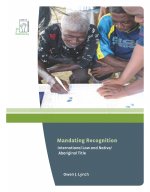Date: June 13, 2011
This essay identifies, summarizes and analyzes leading international and national laws and judicial cases recognizing or otherwise supportive of native/aboriginal title. Native/aboriginal titles are community-based property rights (CBPRs) typically held by Indigenous Peoples and some other original, long-term occupant local communities.
The paper evinces widespread and growing evidence that international law is moving towards (and arguably already is) mandating legal recognition of native/aboriginal title to indigenous territories and ancestral domains. It references decisions of the International Court of Justice (ICJ), the Inter-American Court (IAC), and the African Commission on Human and Peoples Rights (N.B. Asia has yet to constitute any juridical entity comparable to the IAC or its European and African counterparts). This emerging mandate in favor of native/aboriginal title is also apparent in international conventions and declarations, as well as at least 14 nation states that are already obliged under domestic law, albeit in differing ways, to recognize Indigenous Peoples’ and others’ native/aboriginal titles.
In addition, since 1968, 11 African nations have recognized customary rights as including property rights in their constitutions and/or land laws, as have major international law conventions, declarations and other instruments that are supportive of native/aboriginal title and are also identified.
Finally, the paper summarizes leading cases and instruments in comparative/national (international customary) laws that are likewise supportive of legal recognition.
The essay is not intended to be exhaustive; nor can it be one-hundred percent up to date. Rather, it establishes that the trend in international law—as conventionally understood, as well as customary international law, as evinced in the domestic law of a growing number of nation-states—is moving towards mandating the legal recognition of native/aboriginal title.

